石榴籽·同心圓 | 侗族:河水永流 歌聲不斷
今天,一種極富特色的民歌演唱形式面臨傳承與保護體系上的擔憂。
Today, a highly distinctive form of folk singing is facing the challenge overits inheritance and protectionsystem.
小黃村,位於貴州省黔東南從江縣深山中。錯落有致的侗寨、點綴其間的鼓樓,風雨橋邊染布的婦女,構成了一幅侗鄉山水人的和諧畫面。
Xiaohuang Village is nestled deep in the mountains of Congjiang County, Qiandongnan Miao and Dong Autonomous Prefecture, southwest China's Guizhou Province. The neatly seated Dong ethnic houses, scattered drum towers and women dyeing cloth by the Wind-rain bridgesform a harmonious picture composed by the mountains, rivers and people in the ethnic village.
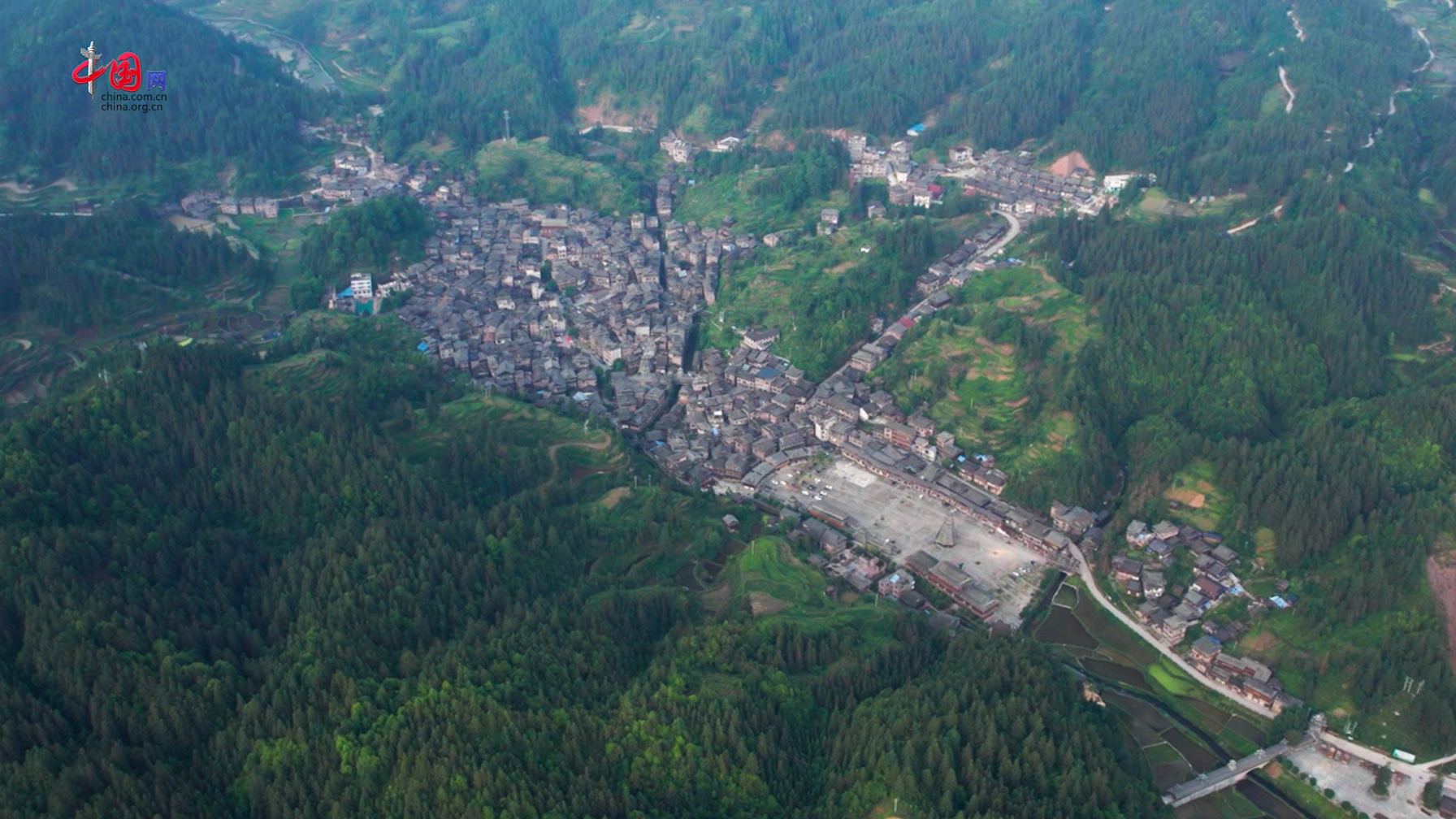
鼓樓是侗族人民社交、娛樂和舉行重要活動的場所,也是侗族大歌日常訓練、接待遠方客人的標誌性建築。
The drum tower serves as a venue for social gathering, entertainment, and important events for the Dong ethnic group. It is also a landmark building where the Dong people practice the grand song and welcome guests from afar.
侗族大歌以其獨特的演唱方式和組織形式傳承著侗族的歷史和文化,是侗族社會結構、婚戀文化和精神生活的重要組成部分。
The grand song of the Dong ethnic group, with their unique singing style and organizational structure, carry the history and culture of the Dong people. They are an integral part of the Dong social structure, marriage customs, and spiritual life.

夏日午後,來自中央音樂學院的師生和身著侗族傳統服飾的老人共聚鼓樓,共話這門音樂藝術。鼓樓內,還有一對比利時籍夫婦,得益於不久前施行的免簽政策,他們選擇來到中國,沒想到這趟旅行還有了意外“收穫”。
On a summer afternoon, students and teachers from the Central Conservatory of Music gather at the drum tower, along with elderly individuals dressed in traditional Dong attire, to discuss this art form. Inside the drum tower, there is also a Belgian couple who, thanks to the recently implemented visa-free policy, werevisiting China. Little did they know that this trip would bring them unexpected "gains."
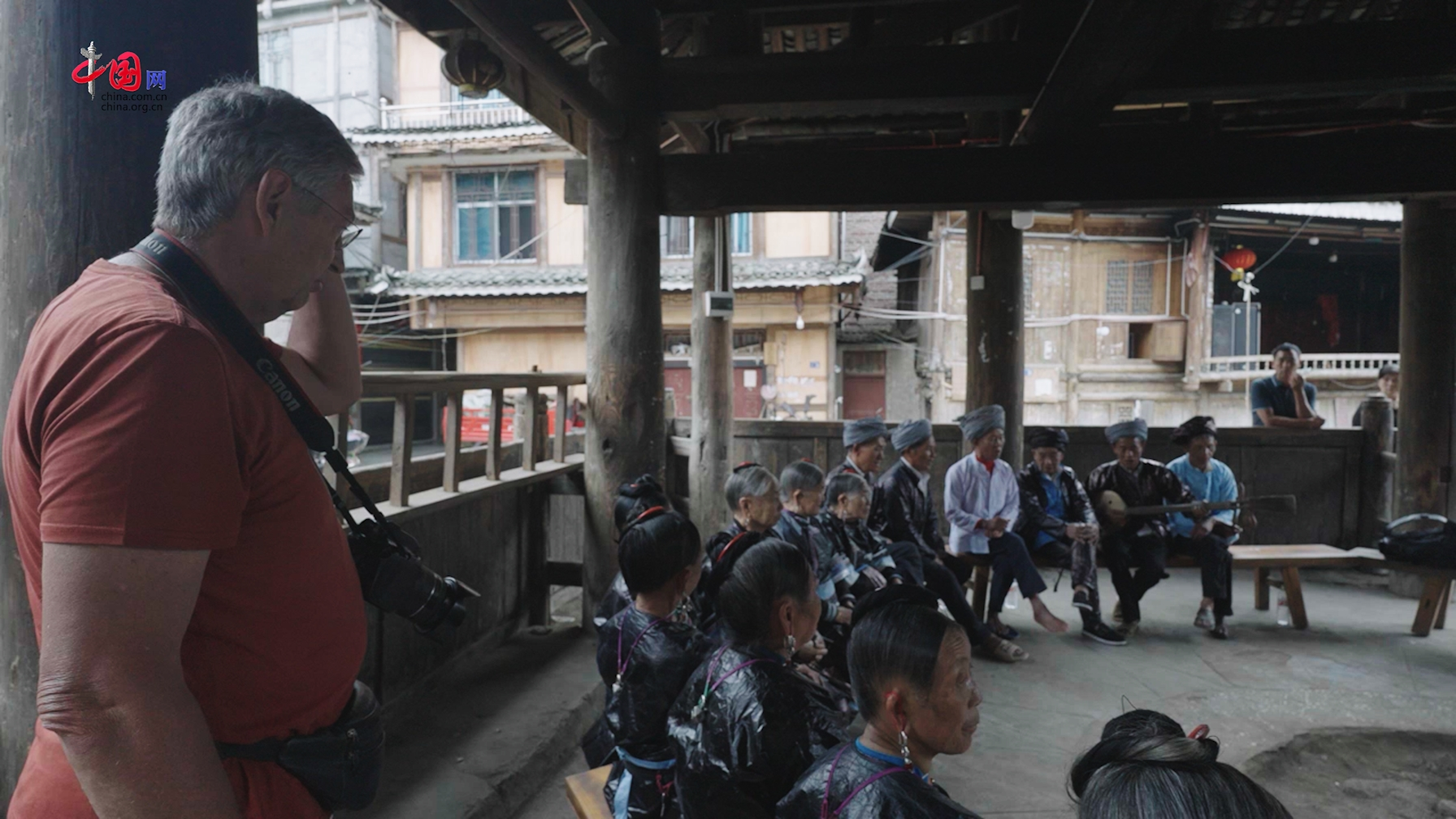
鼓樓大歌的演唱通常採用分部合唱的形式,結合了領唱(獨唱)與眾唱,要求歌手們在沒有指揮的情況下協作演唱。這種“默契”在頂級歌手之間,往往只需要眼神間的交流或是歡笑的回應,富於變化的節拍,不懂侗語也“引人入勝”。
The grand song at the drum tower is usually performed via sectional choir singing, combining solo and group singing. Singers are required to collaborate without a conductor. This "telepathy" between top singers often only requires eye contact or a smile. The ever-changing rhythms and captivating melodies of the songs are captivating even to those who do not understand the Dong language.
小黃侗族大歌自清代形成獨立體系,經歌師不斷向周邊傳承,極大豐富了侗族大歌的曲目。小黃村能唱歌的十有八九,並非誇談。“飯養身,歌養心”這種樸素的智慧,表達了侗族人民對自然、生活和社會的感悟,也加強了彼此間的聯繫和認同感。
The Xiaohuang Village's Dong grand song has developed as an independent system since the Qing Dynasty and has been passed down by singing masters to the surrounding areas, greatly enriching the repertoire of Dong grand song. It is not an exaggeration to say that almost everyone in Xiaohuang Village can sing. The simple wisdom of "food nourishes the body, while singing nourishes the soul" expresses the Dong people's understanding of nature, life, and society. It also strengthens their connection and sense of identity with each other.
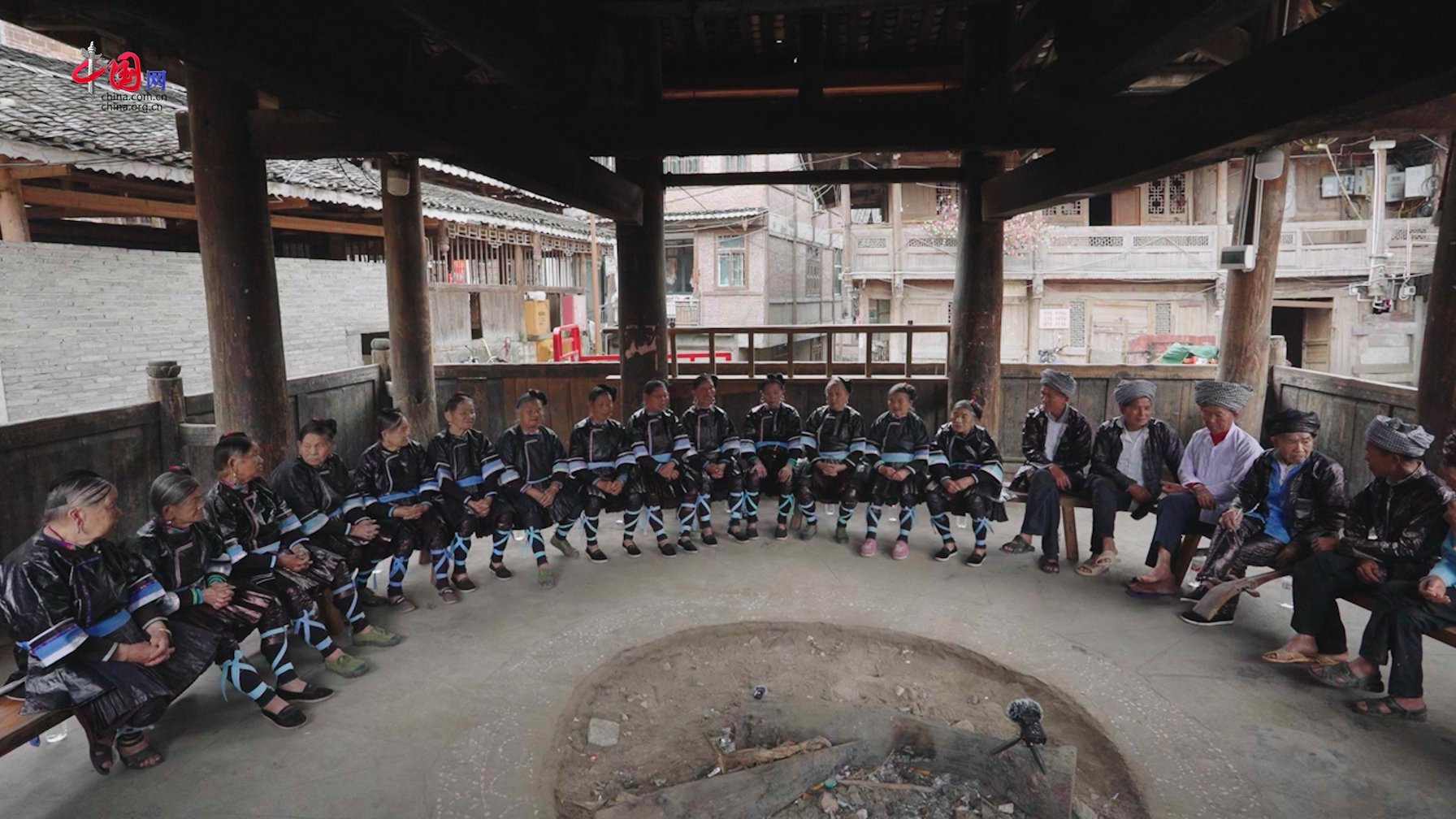
潘薩銀花:“這條河叫‘傳歌河’,我們這裡有一個故事,有一個老人編出一首歌來,邊唱歌邊勞動,光勞動也沒有開心,也沒有快樂。人不唱歌人會老,花不聽歌花不開。”
Pan Sayinhua: "This river is called ‘Song-Race River.’A story has it that an elderly person composed a song, andsang it while working. Just working without singing is not a happyexperience. People age without singing, and flowers won't bloom without listening to songs."
曲終人散,餘音繞梁……而歌手們通常將回歸生活,現身市井。近年來,由於年輕人外出打工的“缺席”,侗族大歌傳承則“交棒”給了小學生,但這仍讓潘奶奶擔憂。
After the grand song performance ends, its melodies can still linger for a while. However, the singers often return to their normal livesand embrace the hustle and bustle of the city. In recent years, with the absence of young people due to migration for work, the inheritance of the Dong ethnic group's grand song has been passed on to primary school students. However, this situation still leaves GrandmaPan worried.
潘薩銀花:“我心裏很難過。想把我心裏的歌都教給他們,那我才放心。現在他們就是沒有時間學,我都沒有辦法。我們侗族大歌又沒有侗文又沒有侗譜,很難教的,幾天他們才唱得一首歌。”
Pan Sayinhua: "I feel really sad. I want to teach them all the songs I know, only then will I be at ease. But now they don't have time to learn, and I can do nothing about it. Our Dong ethnic group's grand song doesn't have written scores, making it difficult to teach. It takes them several days just to learn one song."
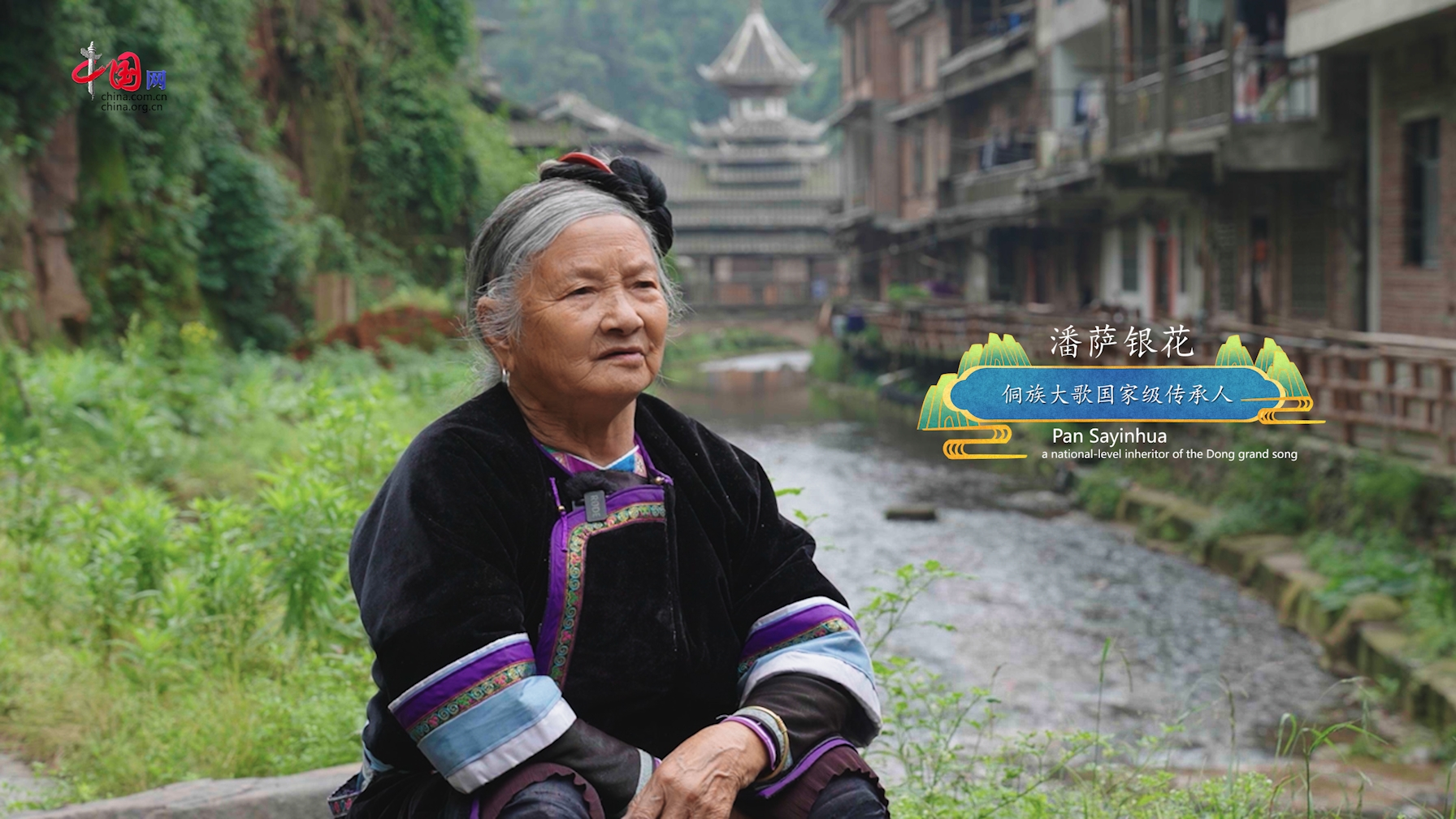
與中央音樂學院師生告別的潘奶奶,腳踩“解放鞋”,步行到了小學校門前,邁上幾十個臺階後,並沒有休息,徑直走進教室開始授課。孩子們可能不會明白,眼前的老人是這項國家級非物質文化遺産的一本“活教科書”。
After bidding farewell to the teachers and students, Grandma Pan, wearing a pair of rubber-soled shoes, walked to the entrance of the primary school. She climbed several dozen steps, andwithout taking a break, went straight into the classroom to start her lesson. The children may not realize it, but the elderly person in front of them is a living "textbook" of this national-level intangible cultural heritage.
合唱《侗歌漢語都要學》歌詞大意:河裏魚兒蹦蹦跳,侗家娃兒學歌真熱鬧。學會侗歌和漢語,送給外婆笑瞇瞇。學會侗歌和漢語,送給奶奶心歡喜。
[Chorus] The general meaning of the lyrics of "Learn both the Dong Grand Song and Chinese": Fish in the river jump and dance, the children of the Dong ethnic group happily learn singing the grand song. Learning both the Dong grand song and Chinesewould bring smiles to grandma's face, as well as bringing joy to grandma's heart."
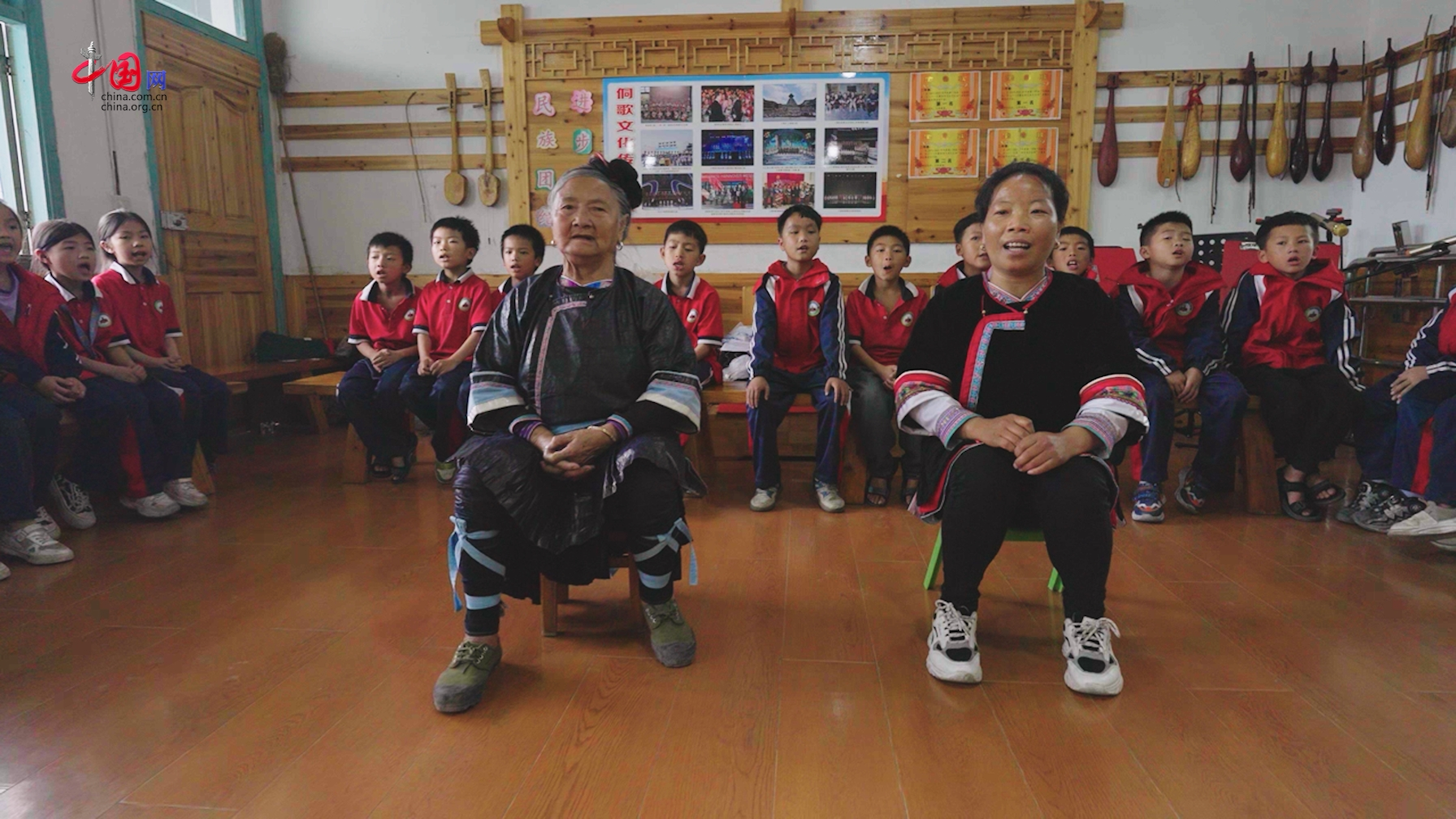
有70餘年建校史的小黃小學,設有專門的侗族音樂課,但卻僅能教授基礎兒童歌曲。孩子們畢業後會去幾十公里外的縣城上學,便不會再繼續學習,讓這門藝術處在後繼無人的窘境。
With a history of over 70 years, Xiaohuang Elementary School has a dedicated Dong ethnic music class. However, it only teaches basic children's songs. After graduating, the children will go to schools in the county, which is dozens of kilometers away, and they will no longer continue their music education. This situation has left this art form in a predicament with no successors.
潘薩銀花,自幼學習侗族大歌,師承她的學生已經有千余名。潘奶奶如今已耄耋之年,由於近來腿腳不好,空閒時間還會在家做紙賺些錢,她做的紙張幾十年不會壞掉。
Pan Sayinhua, from a young age, has been studying the traditional Dong grand song. She has taught over a thousand studentsabout the folk art. Now in her old age, Grandma Pan's legs have been giving her trouble. In her free time, she makes paper at home to earn some money. The paper she makes can last for decades without deterioration.
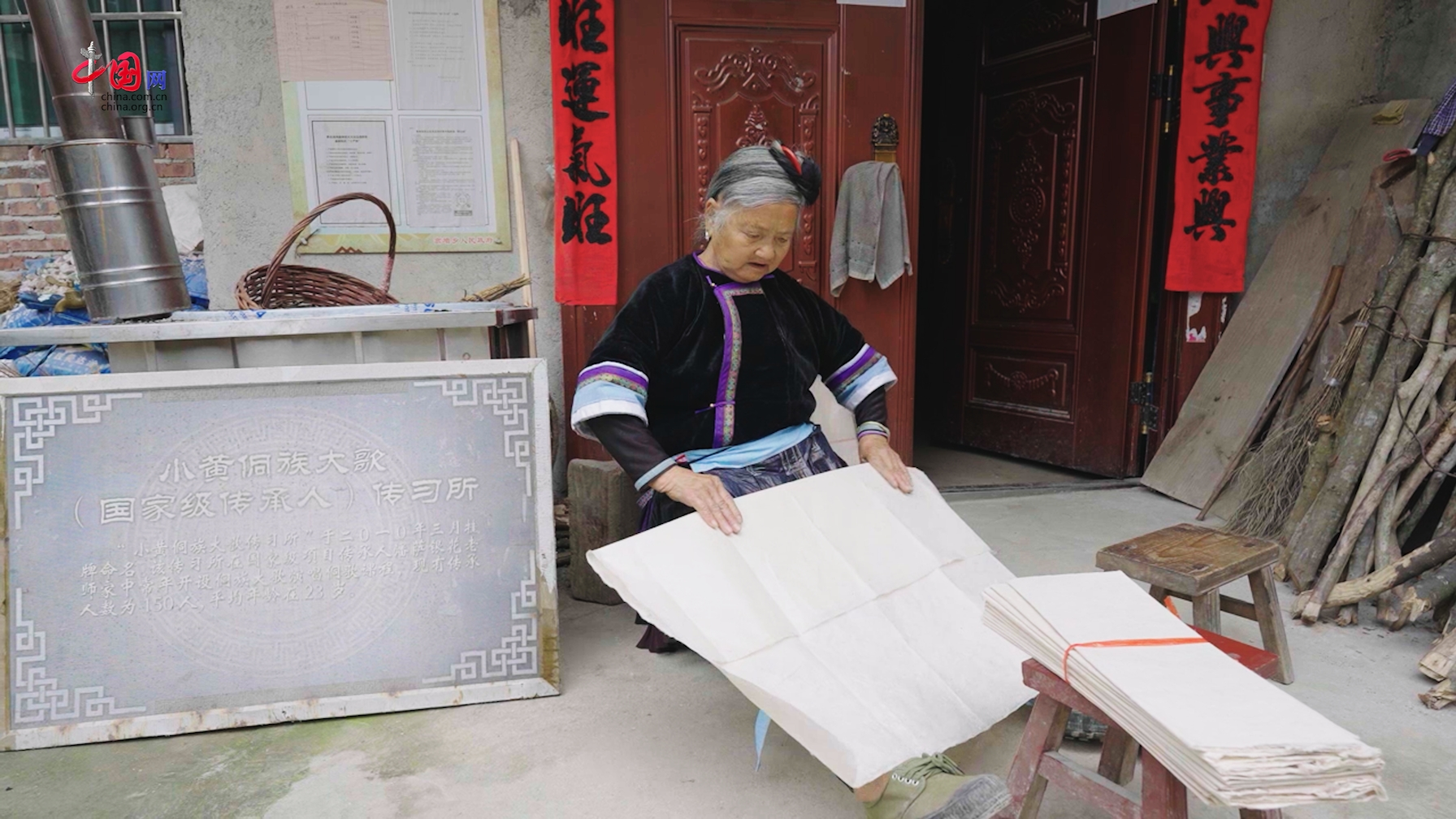
潘薩銀花:“四、五歲會講話開始,就跟老人開始學歌,爸爸媽媽白天上山,晚上回來我們吃飯過後,就是學侗族大歌。小的時候開始教歌,就是教《築塘歌》”
Pan Sayinhua: "I started learning the songs from the elderly when I was able to speak at around four or five years old. During the day, my parents would go to the mountainsto work, and in the evening when they returned, we would have dinner and then start learning the Dong grand song. I started teaching the grand song when I was young, which was the 'Song of Building Ponds.'"
潘奶奶不會用電腦,平時只能用手機錄些歌保存。而奶奶最喜歡的情歌,侗族青年男女鼓樓下你儂我儂的對歌畫面已幾近消失。令人欣慰的是,當地文旅部門將這些藝術搬上了“鄉村週末大舞臺”,各民族輪流進行演出。
Grandma Pan, who could not use computers, can only record songs on her mobile phone. However, the scenes in her favorite love songs, which are about Dong ethnic young men and women engaging in affectionate duets under the drum tower, have vanished. It is heartening to note that the local cultural and tourism department has brought theart to the weekend performance activity in rural areas, where different ethnic groups take turns to showcase their fork performances.
《築塘歌》主要描繪侗族小朋友一起玩泥巴的場面。歌詞大意:侗家娃,挖泥巴,來玩耍,築成水塘養魚蝦,築成水塘種莊稼。
[Solo] "Song of Building Ponds" primarily depicts scenes of Dong ethnic children playing with mud. The lyrics: The Dong childrenare digging mudfor play. They try to build ponds to raise fish and shrimp, and cultivate crops in them.
學術支援:中央民族大學網際網路平臺企業發展與治理研究中心
Academic Support: Research Center for Internet Platform Enterprise Development and Governance at Minzu University of China
鳴謝:從江縣文體廣電旅遊局
Acknowledgement: Congjiang County's bureau of culture, sports, broadcasting, TV and tourism










